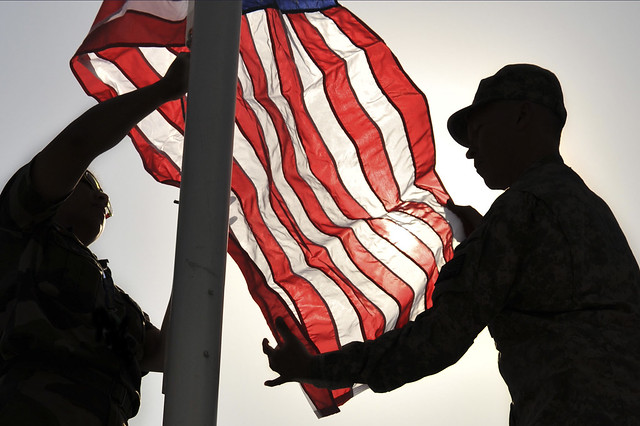A National Anthem that Begins and Ends with a Question
July 4, 2012
by David P. Goldman
There’s no mistaking Francis Scott Key for a great poet, but like other minor talents at exalted moments, Julia Ward Howe, for example, he wrote a great poem. It might seem a stretch to think of “The Star-Spangled Banner” as high art, but its first verse, despite some deficiencies, has true grandeur. Some years ago I discussed America’s anthem at Asia Times. In honor of the 4th of July, here are some revised thoughts.
There is something inherently fragile about the United States of America. France will be France and Slovakia will be Slovakia so long as French and Slovak are spoken, irrespective of their mode of government. But if Americans cease to govern themselves in a way that no people ever governed itself before, America will not be America. We are the only nation founded on an idea, rather than on blood, territory or culture. We look back at our founders with reverence. Each day we should ask ourselves whether we are good enough to keep the republic which they bequeathed us. We came close to losing it more than once. If we continue to drift into dependency, we might lose it now.
That is why it behooves us to sing a national anthem that begins and ends with questions. In this respect, “The Star-Spangled Banner” is an unusual poem. To begin a poem with a rhetorical question is a common enough device (“Why! Who makes much of a miracle?,” “What is so rare as a day in June?” or “Who rides in the night through wind and wild?”). Key’s opening question, though, is not rhetorical, but existential. The hearer from whom the poet demands a response has kept the poet’s company in an anxious vigil. The question itself thus places the hearer alongside the poet in that vigil.
The poet withholds the name of the object we are trying to espy in the first light: It is “what so proudly we hailed,” “whose broad stripes and bright stars” streamed valiantly over the rampart as the poet and his interlocutor watched through the perilous night. And this precious thing could be glimpsed intermittently only by the light of the enemy’s munitions, through the glare of rockets and the flash of exploding bombs: these, the missiles of the foe, gave proof through the night that the our flag — at last the object is named — was still there.
But now the first light of the dawn has come. The bombardment has ceased. The poet asks that the listener say whether, in the dim sunrise, he still can see the flag above the ramparts. It is an anxious moment; the hearer has watched through the night to see if the US position has held or fallen; in a few moments he will see in the first light of day whether the flag is still there. All the fears of the nightly vigil are bound up in this moments of anticipation. Even more: the hopes and fears of generations hang upon what the hearer will see as day breaks..
And then the poet repeats the injunction “Say!” and changes the question. The opening question — can you still see our flag? — is a synecdoche of sorts for a bigger question — does that flag “yet wave/O’er the Land of the Free and the Home of the Brave”? The second question refers not only to the battle at hand, but to the destiny of the country. The question is not only whether the flag of freedom still flies over America but also whether America itself is still brave and free. the rest

O say can you see by the dawn's early light,
What so proudly we hailed at the twilight's last gleaming,
Whose broad stripes and bright stars through the perilous fight,
O'er the ramparts we watched, were so gallantly streaming?
And the rockets' red glare, the bombs bursting in air,
Gave proof through the night that our flag was still there;
O say does that star-spangled banner yet wave,
O'er the land of the free and the home of the brave?
On the shore dimly seen through the mists of the deep,
Where the foe's haughty host in dread silence reposes,
What is that which the breeze, o'er the towering steep,
As it fitfully blows, half conceals, half discloses?
Now it catches the gleam of the morning's first beam,
In full glory reflected now shines in the stream:
'Tis the star-spangled banner, O! long may it wave
O'er the land of the free and the home of the brave.
And where is that band who so vauntingly swore
That the havoc of war and the battle's confusion,
A home and a country, should leave us no more?
Their blood has washed out their foul footsteps' pollution.
No refuge could save the hireling and slave
From the terror of flight, or the gloom of the grave:
And the star-spangled banner in triumph doth wave,
O'er the land of the free and the home of the brave.
O thus be it ever, when freemen shall stand
Between their loved home and the war's desolation.
Blest with vict'ry and peace, may the Heav'n rescued land
Praise the Power that hath made and preserved us a nation!
Then conquer we must, when our cause it is just,
And this be our motto: "In God is our trust."
And the star-spangled banner in triumph shall wave
O'er the land of the free and the home of the brave!
...Francis Scott Key image


0 Comments:
Post a Comment
<< Home